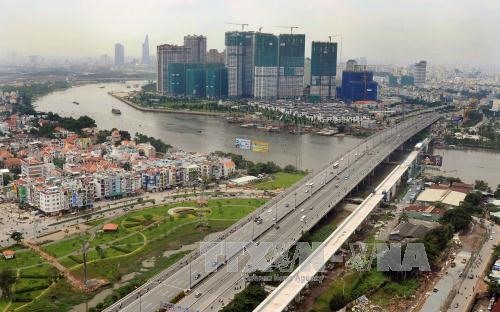 Society
Society

HCM City authorities have asked the Government to consider allowing the city and provincial level administrative agencies to approve metro projects to ensure that construction remains on schedule.
 |
| An elevated section of HCM City’s Bến Thành – Suối Tiên metro line runs along the Sài Gòn River. — VNA/VNS Photo An Hiếu |
HCM CITY — HCM City authorities have asked the Government to consider allowing the city and provincial level administrative agencies to approve metro projects to ensure that construction remains on schedule.
In a report sent to the Ministry of Transport on the city’s railway development over 10 years, Trần Vĩnh Tuyến, vice chairman of the city’s People’s Committee, said that ministries required a lot of time to screen and approve the list of metro sponsors before sending it to the Prime Minister.
He said that, by the time the construction starts, the design and total investment costs must be adjusted to fit the new situation.
Vietnamese regulations on the use and management of official development assistance (ODA) funds and preferential loans are different from those of international funding sponsors for metro projects.
As such, every adjustment needs to be discussed and approved by the sponsors, which further delays the project.
The city metro lines, which are huge billion-dollar projects, have to go through different levels of approval, which also lengthens the process.
The city’s plan calls for eight metro lines with a total length of 220km at a cost of US$25 billion; six bus rapid transit (BRT) routes with a total length of 100km at a cost of $1 billion; and three tramway or monorail routes.
Fifty-three per cent of the work on metro line No 1 (Bến Thành – Suối Tiên route) has been completed. It is expected to open for operation sometime in 2020.
Metro line No 1 was approved by the city in April 2007 with an investment of VNĐ17.4 trillion ($766.4 million). After investment costs were re-calculated by consulting agencies, costs rose to more than VNĐ47.3 trillion.
The cost adjustment has been submitted to the National Assembly for approval.
HCM City authorities attributed the rising costs to price changes for construction materials, an increase in the minimum wage, and the depreciation of the Vietnamese đồng and Japanese yen, among other reasons.
As for metro line No 2, which connects Bến Thành market in District 1 with Tham Lương in District 12, the city People’s Committee in 2010 approved a design by a local consulting firm with a total investment of $1.37 billion.
However, after the completion deadline was extended from 2020 to 2026, investment capital needed for metro line No 2 rose, from VNĐ26 trillion to nearly VNĐ48 trillion. —VNS




